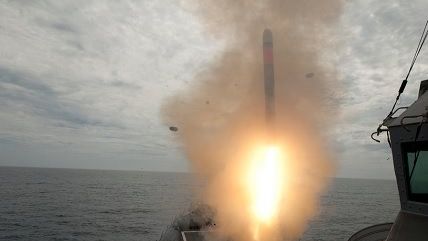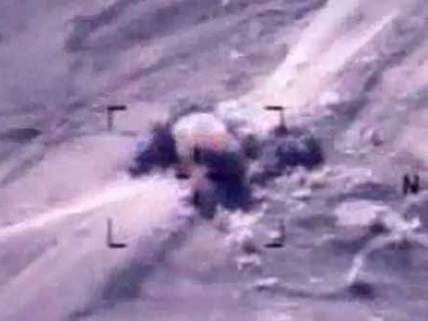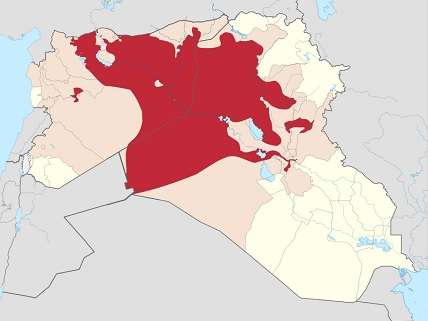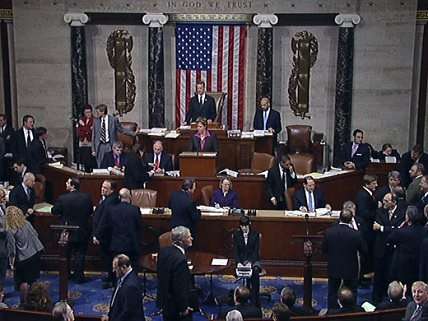Four Reasons Bombing ISIS in Syria Isn't Well Thought-Out
Bad idea


Last night, the Pentagon announced that bombing operations by the U.S. and its anti-ISIS coalition "partners" had begun over Syria. The air campaign in Syria against ISIS, the Islamic State of Iraq and al-Sham (or Syria), extends the U.S. war on the terrorist group-cum-self-proclaimed caliphate from Iraq, where an American air campaign began earlier this month. Barack Obama became the fourth consecutive U.S. president to order air strikes in Iraq.
President George Bush went into Iraq in 1991 during the Gulf War under the auspices of a U.N. Security Council resolution against the Iraqi invasion of Kuwait and with a resolution authorizing the use of military force (AUMF) from Congress. In the late 1990s, President Bill Clinton ordered airstrikes in Iraq in 1998, claiming Saddam Hussein had been thwarting U.N. weapons inspectors, sans Congressional authorization, arguing the strikes were a temporary measure covered by the War Powers Act. In 2003, under the pretext of problems with the treatment of U.N. weapons inspectors and using multiple U.N. Security Council resolutions to justify the action, President George W. Bush ordered an invasion of Iraq. He, too, had an AUMF, pinned on U.N. Security Council resolutions worried about weapons of mass destruction (WMD). This year President Obama reinserted the U.S. military into Iraq to combat ISIS.
Predictably, the U.S. war against ISIS, which claims territory in Iraq and Syria, has extended into Syria itself. The bombings in Syria are a bad idea, as is the wider war against ISIS, for a host of reasons.
1. This clusterfuck's a clusterfuck
Last year the U.S. wanted to bomb Syria over the Assad regime's alleged use of chemical weapons. Eventually, thanks to an off-the-cuff remark by John Kerry his Russian counterpart exploited, the Syrian regime disarmed under the watch of international inspectors. Although the U.S. did not identify regime change as a reason to bomb Syria last summer, neither did it identify regime change when it intervened with NATO in the Libyan civil war. That intervention ended with the Libyan leader, Col. Moammar Qaddafi, sodomized and killed by rebels in the summer of 2011, as protests in Syria began to transform into an armed insurgency, too. In the immediate aftermath of the Libyan civil war, the Obama Administration took credit for offing a bad guy and bringing democratic government to Libya. In September 2012, militants attacked a U.S. facility in Benghazi, and this year militants gave the local government a run for its money, pressing for political control, and oil revenue. A coalition of Arab nations conducted air strikes in the country.
Had the U.S. bombed Syria last summer, it would've likely strengthened the position of various rebel groups pressing for political control. ISIS has emerged as the strongest of these, despite being dismissed as junior varsity by the president (along with other "Al-Qaeda affiliates," like Boko Haram) back in January. Other rebel groups, including ones Congress authorized the U.S. military to arm (an idea the CIA has tried and dismissed), have tried to avoid conflict with ISIS. Several groups reportedly signed a "non-aggression" pact with ISIS (which other groups downplayed or denied), and even the Free Syrian Army, Washington's favorite rebel outfit, says it refuses to join the anti-ISIS coalition.
Washington and the region's focus has shifted to ISIS, a greater threat to security in the Middle East than the Assad regime, but the rebels in Syria haven't. In Libya, Western intervention felled the dictator quickly, but the country eventually became a battleground for competing proto-government militant groups. In Syria the country is becoming so without the felling of a dictator. Bombing ISIS in Syria may strengthen the Assad regime, other rebel groups, or a different set of jihadis looking to pick up where ISIS is left off.

2. It shifts responsibility away from governments threatened by ISIS
This morning CNN reported that the "U.S. and Arab partners bomb ISIS in Syria." Which Arab partners? Bahrain, Saudi Arabia, the United Arab Emirates, Jordan and Qatar, according to CNN, which cites an unnamed source, illustrating the snares of U.S.-led intervention. ISIS poses a threat to all those countries and others in the region—it has declared itself a Muslim caliphate, to rule over Iraq and the Levant, which stretches from Turkey to the Sinai. Yet those countries would prefer to hide in the background of a U.S. operation against ISIS, in part because they have fomented the very kind of virulent fundamentalist Islamism that fuels ISIS and groups like it in a bid to maintain power and influence.
In Iraq, U.S. airstrikes followed Iranian airstrikes against ISIS. Iran, like the U.S., is close to the Iraqi government. But the two countries refuse to cooperate and consider friends foes and vice-versa in the region, from Saudi Arabia to Syria. The threat ISIS poses to all these countries is real, and ought to be met by them. U.S. leadership in the anti-ISIS campaign in Iraq, and now Syria, where a slew of other countries have been involved over the last several years, only stymies the possibility of self-interested coalition-building, the strongest foundation for mutually beneficial international relations.
U.S. disregard for the regional actors, like Iran and Russia, that have been involved in the very real "war on terror" in Syria, isn't helpful to regional stability, either. Syria said the U.S. informed its representative at the U.N. before bombing of Raqqa, the Islamic State's capital in Syria, began. Try as U.S. military planners may to not allow the bombing campaign to help the Syrian regime's strategic position too much, any effective campaign against ISIS will do so. It's counterproductive to deny that reality, and to insist on replaying Rocky IV rather than engaging Russia on the issue.

3. There's no Congressional authorization
The argument that U.S. actions in Iraq are covered by the post-9/11 AUMF against al-Qaeda and associated forces ought to rejected. ISIS broke off with al-Qaeda and challenged its authority—claiming itself a caliphate with dominion over all Muslims—very publicly. ISIS began as an al-Qaeda affiliate in Iraq before crossing over to join the civil war in Syria and eventually challenge the local al-Qaeda affiliate there. By the time it returned to Iraq it was the Islamic State in Iraq and al-Sham, challenging terrorist groups and governments across the region. ISIS has as much to do with 9/11 as Iraq did in 2003. Even George W. Bush, whose administration tried to link Saddam Hussein's Iraq to 9/11, didn't try to use the 9/11 AUMF for the Iraq War.
In the end, the 2002 AUMF for Iraq didn't mitigate the disasters of that war. The weapons of mass destruction used to justify the AUMF and UN resolutions were never found, and long after the Bush Administration declared "mission accomplished," the mission in Iraq continued to evolve to spreading democracy and nation-building.
Would an authorization for the use of military force in Syria make a difference? No. Even on a political level, while Barack Obama claimed he'd have voted against the Iraq War, he's surrounded himself by advisors—Joe Biden, John Kerry, et al—who voted for it. Congressional backers of the war claimed the Bush administration misled them, as if asking questions weren't their job. A declaration of war might work better, and would satisfy the strict reading of the Constitution. Perhaps asked to declare war on Saddam Hussein's Iraq, members of Congress would less easily ignore the gravity of their decision.
In the case of Saddam Hussein's Iraq and ISIS, U.S. military action certainly feels like a war. Wars demand aims. They can still fail to meet their goals, and wars are always destructive, but aimless engagements are ripe for prolonged war. Congressional authorization, at the very least, would set down the specific reasons for U.S. engagement and provide a record for future presidential candidates to relitigate or run away from.

4. It provides ISIS with more legitimacy, propaganda for recruitment, direct action
From Barack Obama to Tony Abbott to Rand Paul, the beheadings of multiple hostages by ISIS has been used as justification for the escalation of the anti-ISIS campaign. Yet in the very first ISIS video, the masked militant on camera blamed U.S. airstrikes in northern Iraq tied to the rescue of a religious minority besieged by ISIS for the beheadings. Whether the savages would have found another reason to slice heads off notwithstanding, ISIS draws its legitimacy from anti-Americanism. The same fuel that keeps kleptocratic regimes in the region in power is harnessed to keep ISIS' fighters aflame. In the comic book world of ISIS' leaders, a great final battle with the United States is welcomed, even if it means their very degradation. ISIS fighters can be killed, its leadership decimated, but their "martyrdom" will prepare the next generation of fighters.
The other regional governments' inability to act without the United States, meanwhile, will further strengthen ISIS' case for territorial sovereignty among those who matter, the residents of the territories being fought for. U.S. intervention, then, disincentivizes regional powers from acting against ISIS on their own while providing ISIS the kind of legitimacy that brings it closer to the level of the regional powers.
All the while there's no greater recruitment tool than the wrath of the United States, which can attract jihadis from the world over, to the battlefields in Iraq and Syria, and to attempt the kind of lone wolf-but-inspired attacks like the Fort Hood shooting or the Boston Marathon bombing that are then used by supporters of more intervention to argue for more intervention. The excitable Sen. Lindsey Graham (R-S.C.) recently implored President Obama to do something about ISIS "before we all get killed here at home." We're at no risk of that, as the Obama Administration acknowledges, but the kind of shoot first, ask questions later attitude displayed by politicians like Graham just might.


Show Comments (40)